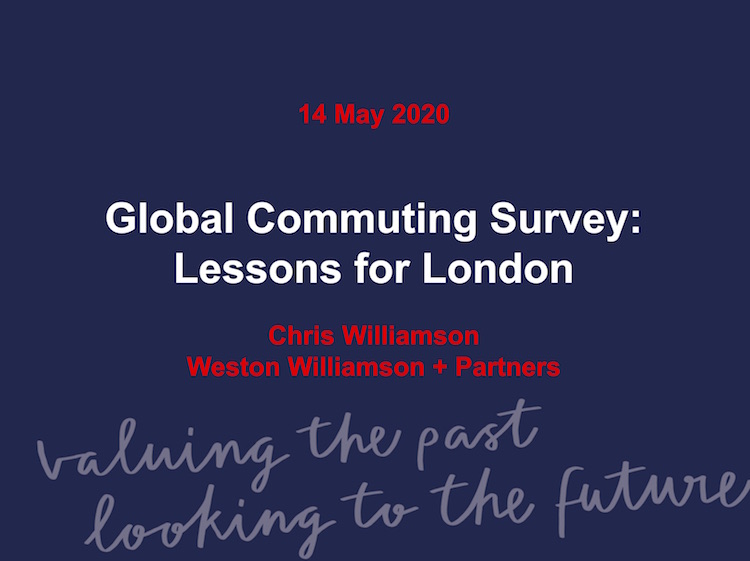Post
REPORT | Global Commuting: Lessons for London
18 May 2020
A new report by Weston Williamson + Partners reveals the habits and experiences of 2000 commuters in 10 world cities. How we get to work, how long it takes us and what kind of mood we are in when we get there. It also examines our attitudes towards climate change and whether our concern for the future of the planet affects our choices when it comes to commuting. In this London Society talk, founding Partner Chris Williamson delves into the findings to see which cities we can learn from, in order to make London healthier and more enjoyable to move around. Abigail Lane reports, and a video of the presentation is at the foot of this post:
With the announcement that the London Underground is running at 10% of its normal capacity, and some workers told to work from home until at least September, the way we commute in London is facing unprecedented change. The London Society’s first talk under lockdown conditions was, then, on an appropriate topic: global commuting lessons for London.
Founding partner Chris Williamson of Williamson and Partners presented his research into global commuting habits, the conclusions of which were drawn just before the world went into lockdown. The study examined commuter satisfaction, motives, preferences and concerns in 10 global cities: Manchester, London, New York, Los Angeles, Toronto, Vancouver, Sydney, Melbourne, Singapore and Hong Kong. The results were far-reaching in their scope and fascinating in equal measure.
The report found that people factor in their commute when choosing a place to live, in keeping with historical trends. According to the research, the over 60s commuted the longest (26km on average), whilst under 25s had shorter commutes (at 16km). The geography of the cities was also cited as an influential factor: longer commutes are to be found in Melbourne and Toronto due to the geography of the land, whereas in Manchester, more than 43% of journeys take less than half an hour.
Unsurprisingly, for Londoners a key factor in their choice of transport is cost, with under 25s prioritizing saving money on travel more than the over 60s. Interestingly, 70% of older people spend less than 10% of their salary on commuting, whilst in other age groups 55% are spending less than 105 of their salary on commuting.
Drivers rated their method of commuting generally quite highly, with 80% of respondents in Sydney, 73% in Singapore and 66% in New York rating their drive to work as good. The bus in 7/10 cities is considered good value. The figure was higher for cyclists: 100% of the cyclists questioned deemed the bike as being excellent value for money, with the exception of Manchester. Indeed, the car reigns supreme as mode of transport in all cities studied except Hong Kong. Over 60% driving in New York, cyclists and walkers London has the most cyclists but even that is low at 4%. Could change post-COVID could emerge from lockdown restrictions with a higher percentage annual survey
The report also investigated the affect of the commute on people’s mood. When asked if commuting affected their mood, 76% of respondents in Vancouver said yes. The figure for LA, London and Sydney stands at 43%, 78% and 57% respectively.
Respondents noted that the train packs people ‘in like sardines with dead looking eyes’, with one saying that ‘if the train is jam-packed and I don’t have any personal space I’m generally in a bad mood when I get to work.’ Cyclists were happier after their commute
Whilst providing an interesting examination of current commuting habits, the report also provides a valuable point from which future comparisons can be made. With 70% of New Yorkers never working from home before the pandemic, it will be interesting to see how these figures change in the future.
Members of the London Society can access the recording of the full talk via our Online Archive page. Non-members will need to have a 12 month online access pass, which can be obtained here.
